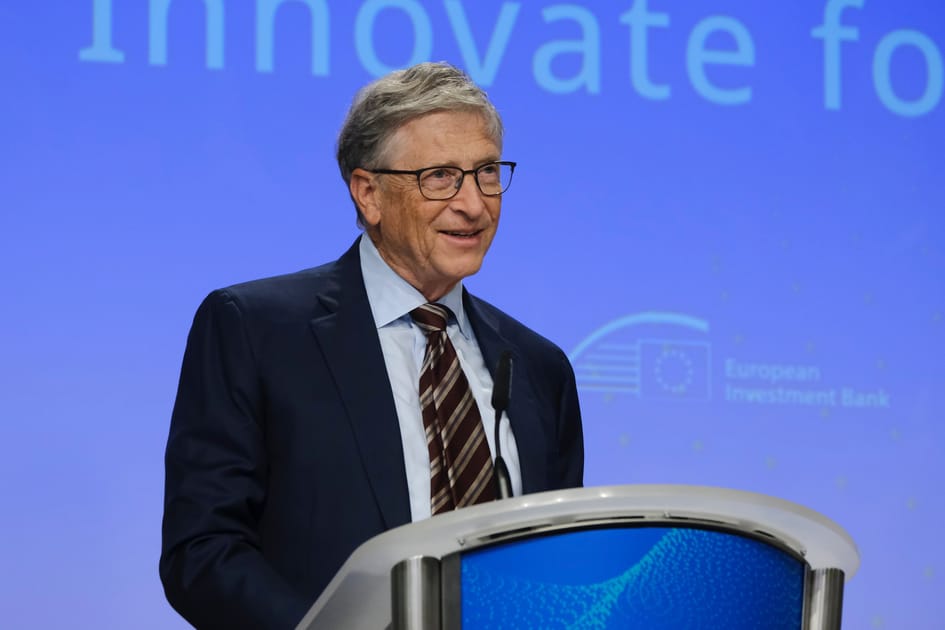
Bill Gates said Monday that Africa will receive the lion’s share of the $200 billion that his charitable foundation plans to distribute over the next two decades, with the announcement shedding fresh light on the philanthropic goals of one of the world’s wealthiest men, who last month said he would give away the vast majority of his fortune.
“I recently made a commitment that my wealth will be given away over the next 20 years. The majority of that funding will be spent on helping you address challenges here in Africa,” Gates said in a speech at the African Union (AU) headquarters in Addis Ababa, the capital of Ethiopia, according to a statement from the Gates Foundation.
Last month, Gates announced his foundation would permanently close on Dec. 31, 2045, with up to $200 billion in spending planned before that date, funded in large part by the Microsoft founder’s own commitment to give away nearly all of his vast fortune. This marked a change from his original plans for the foundation, which he initially planned to sunset several decades after his death and that of his ex-wife, Melinda French Gates.
“A few years ago, I began to rethink that approach,” Gates said in a May 8 statement, referring to the original plans for the foundation to continue operating after he dies. “More recently, with the input from our board, I now believe we can achieve the foundation’s goals on a shorter timeline, especially if we double down on key investments and provide more certainty to our partners.”
French Gates left the foundation in 2024 after her divorce from Gates. At the time, she pledged to commit some $12.5 billion to the foundation under the terms of their separation agreement.
Gates’s visit to Ethiopia aimed to bolster ties between his foundation and the AU, according to a statement from the organization, which noted that discussions focused on improving Africa’s health systems, enhancing food security, and expanding local production of medicines and vaccines.
In his speech, Gates touched on his early philanthropic steps in the 1990s, saying his foundation’s subsequent work on vaccinations was inspired by an article discussing the prospect of reducing diarrhea deaths among African children by inoculating against the rotavirus.
“Early in the foundation’s history, we were a founder of a group called GAVI [Global Alliance for Vaccines and Immunization] that was there to help buy vaccines. We spent the money to make sure the cost of that viral rotavirus vaccine went down from $30 to under $2,” Gates said.
Gates’s vaccination efforts have drawn a mix of praise, criticism, and conspiracy theories—including claims that African children were used as “guinea pigs” in vaccine trials or that COVID-19 vaccines contained tracking devices. Gates has rejected such accusations, saying that his foundation’s work has always been driven by the goal of saving lives and reducing suffering.
“A child born in many parts of Africa has 50 times the chance of dying before the age of five than children in other countries and so from this very beginning, starting in the year 2000 the foundation has learned from our partners in Africa,” Gates said in his Monday speech in Ethiopia, adding that some of the innovation that his foundation has worked on in Africa was basic—like improving the organization of the primary health care system—while some has been complex.
“Some of the innovation is very scientific, creating new vaccines for malaria, HIV, and tuberculosis,” he said.
After stepping down as Microsoft CEO in 2000 and relinquishing his role as chairman in 2014, Gates shifted his focus to philanthropy, chiefly through his foundation, citing fellow billionaire Warren Buffett and other major donors as inspiration. Critics accuse him of using the foundation’s charitable status as a tax shelter and say it holds too much sway over international health policy.
Gates also became a prominent voice during the COVID-19 pandemic, with some of his comments on vaccines and public health strategy drawing controversy and opposition.
Jack Phillips contributed to this report.
If you found this article interesting, please consider supporting traditional journalism
Our first edition was published 25 years ago from a basement in Atlanta. Today, The Epoch Times brings fact-based, award-winning journalism to millions of Americans.
Our journalists have been threatened, arrested, and assaulted, but our commitment to independent journalism has never wavered. This year marks our 25th year of independent reporting, free from corporate and political influence.
That’s why you’re invited to a limited-time introductory offer — just $1 per week — so you can join millions already celebrating independent news.


